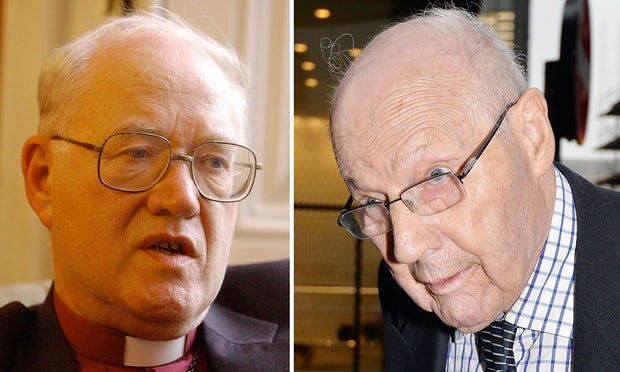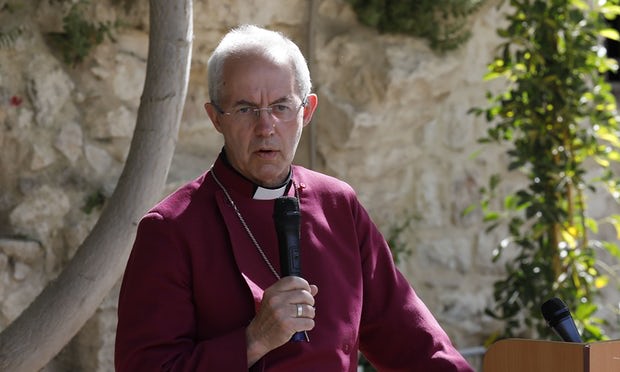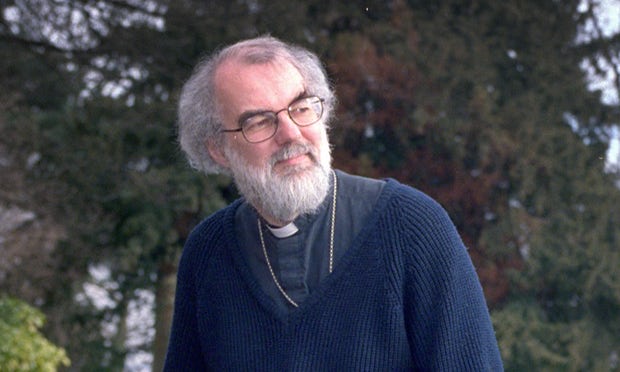Justin Welby Asks George Carey to Quit over Church Abuse Report
By Harriet Sherwood
The archbishop of Canterbury has asked his predecessor George Carey to step down as an honorary assistant bishop after a damning independent report found that senior figures in the Church of England colluded over a 20-year period with a disgraced former bishop who sexually abused boys and men. Justin Welby said the report on the church’s handling of former bishop Peter Ball made harrowing reading. “The church colluded and concealed rather than seeking to help those who were brave enough to come forward. This is inexcusable and shocking behaviour,” Welby said. “To the survivors who were brave enough to share their story and bring Peter Ball to justice, I once again offer an unreserved apology. There are no excuses whatsoever for what took place and the systemic abuse of trust perpetrated by Peter Ball over decades.” In a statement, Steven Croft, the bishop of Oxford, said Welby had written to Carey asking him to “carefully consider his position”. Croft and Carey would meet “in the coming days for that conversation. In the meantime he has voluntarily agreed to step back from public ministry.” Carey and Rowan Williams, another former archbishop of Canterbury, apologised to the victims of Ball after being criticised for their failures in relation to him. Ball, a former bishop of both Gloucester and Lewes, was jailed in October 2015 for the grooming, sexual exploitation and abuse of 18 vulnerable young men aged 17-25 who had sought spiritual guidance from him between 1977 and 1992. He was released from prison in February after serving 16 months. His trial heard that after Ball was first accused in 1993, a string of senior establishment figures – including Carey, cabinet ministers and a high court judge – came forward in his support, writing letters to the police and Crown Prosecution Service. Ball was cautioned by police. He resigned his post as bishop and retired to a rented cottage on the Prince of Wales’s Duchy of Cornwall estate but continued to officiate in 17 public schools until 2007. A fresh investigation was opened in 2012 which led to his conviction.
One of Ball’s victims, Neil Todd – the first to come forward with allegations of abuse – attempted suicide three times before killing himself in 2012. Welby ordered an independent review of the church’s handling of the case, chaired by Dame Moira Gibb, a former chief executive of Camden council. The report, An Abuse of Faith, published on Thursday, said Ball’s case was dealt with at the highest levels within the church. He “was seen by the church as the man in trouble who the church needed to help”. Ball was portrayed as a victim, and the review found “little evidence of compassion for Neil Todd even though from the outset it was clear that he was a vulnerable young man who had come to harm”. It added: “The church appears to have been most interested in protecting itself.” Gibb said the serious sexual wrongdoing of Ball “is shocking in itself but is compounded by the failure of the church to respond appropriately to his misconduct, again over a period of many years”. He said: “Ball’s priority was to protect and promote himself and he maligned the abused. The church colluded. The church colluded with that rather than seeking to help those he had harmed, or assuring itself of the safety of others.” Gibb acknowledged that the C of E had made significant progress in recent years in its understanding of abuse, and had a genuine commitment to meeting its responsibilities towards the victims of abuse. However, the report added, “progress has been slow and continuing, faster improvement is still required”. Gibb made 11 recommendations in her report, including improving support to survivors of clerical abuse and taking steps to “demonstrate the individual and collective accountability of bishops”. Peter Hancock, the C of E’s lead safeguarding bishop, who received the report on behalf of the church, said it had failed Ball’s survivors. “Having read the report I am appalled and disturbed by its contents … As a church we colluded, we failed to act and protect those who came forward for help. There are no excuses. We accept all the recommendations and are working to action them.”
He added: “For the survivors, it may feel this is all too late.” Carey was criticised in the report, which said he “set the tone for the church’s response to Ball’s crimes and gave the steer which allowed Ball’s assertions that he was innocent to gain credence”. Seven letters were sent to Carey after Ball was arrested in 1992, raising concerns about his activities. Only one, which was of least concern, was passed on to the police. “The failure to pass six of the letters to police … must give rise to a perception of deliberate concealment,” the report said. In 1993, Carey wrote to Ball’s identical twin brother, Bishop Michael Ball, saying: “I believe him to be basically innocent.” In a statement responding to the report, Carey said it made “uncomfortable reading” and he accepted its criticisms of him. “I apologise to the victims of Peter Ball. I believed Peter Ball’s protestations and gave too little credence to the vulnerable young men and boys behind those allegations.” Carey said he regretted not putting Ball’s name on the “Lambeth list” – names of people whose suitability for ministry is under question – after he was cautioned. Under the leadership of Williams, the church began reviewing past cases, a move which ultimately led to the criminal case against Ball being reopened, the report said. However, he was criticised as being “lamentably slow” in making change. In a statement, Williams said: “Having read the report and reflected on its details, it is clear I did not give adequate priority to sorting out the concerns and allegations surrounding Peter Ball at the earliest opportunity. I recognise such a delay is likely to have increased the pressure and distress experienced by the survivors of his abuse and I am sincerely sorry for this.” According to the report, Ball intimated “on many occasions, to Lord Carey and others, that he enjoys the status of confidant of the Prince of Wales” and “sought to exploit his contact with members of the royal family in order to bolster his position”. However, the report “found no evidence that the Prince of Wales or any other member of the royal family sought to intervene at any point in order to protect or promote Ball”. Graham Sawyer, a survivor of Ball’s abuse, said he and others were treated with contempt by the C of E. “The church continues to use highly aggressive legal firms to bully, frighten and discredit victims ... In my own case, I continue to endure cruel and sadistic treatment by the very highest levels of the church,” he said. He called for a police investigation into Carey’s role in the Ball case. The National Society for the Prevention of Cruelty to Children said: “It is utterly disgraceful to discover that collusion at the heart of the Church of England led to the abuse of so many young men and boys. “Abuse can happen in any institution or walk of life and we must ensure it can never be covered up by the powerful. Abuse in our most revered institutions must be exposed and investigated, offenders brought to justice, and victims given confidence to come forward.” Every bishop has been sent a copy of the report, which followed a year-long inquiry. Ball refused to take part in the inquiry, but 16 survivors of his abuse gave evidence. In the UK, the Samaritans can be contacted on 116 123. In the US, the National Suicide Prevention Hotline is 1-800-273-8255. In Australia, the crisis support service Lifeline is on 13 11 14.
|
.
Any original material on these pages is copyright © BishopAccountability.org 2004. Reproduce freely with attribution.


